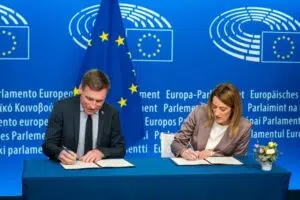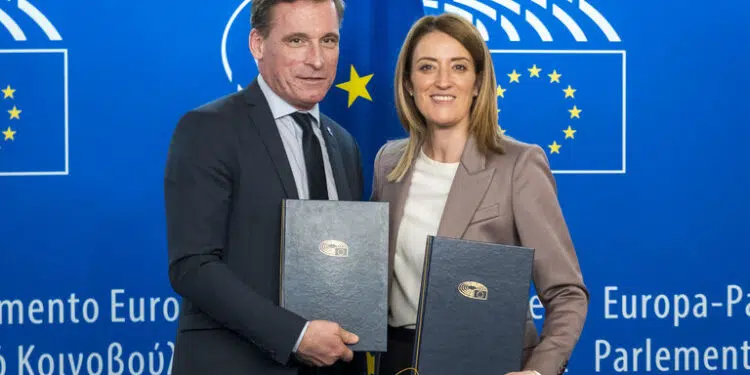Brussels – When there are 100 days before the European elections in early June, the Union’s institutions are closing ranks to push as many citizens to the polls with as much reliable information as possible. It is with this in mind that today (Feb. 27), in Strasbourg, on the sidelines of the plenary session of the European Parliament, the presidents of the parliament and the European Economic and Social Committee (EESC) – Roberta Metsola and Oliver Röpke, respectively – signed a memorandum of understanding to strengthen cooperation ahead of the June 6-9 election in the 27 EU member states.

The document aims to identify areas where the two institutions can deepen cooperation to promote the dissemination of correct information among citizens in the run-up to the European elections. In particular to increase voter turnout—especially among non-voters and first-time voters—and to counter misinformation and information manipulation. “The European elections will be a litmus test of European democracy,” commented Cese President Röpke, claiming that his institution represents “the platform of civil society that fights for this democracy.” It is precisely because of the memorandum of understanding signed today with EU Parliament President Metsola that it will be possible “to play a more active role in the run-up to the elections.”
 According to points of understanding between the two institutions, the EESC will invite representatives of the parliament to participate in the Civil Society Week scheduled for March 4-7 and in debates before and after the election, and close cooperation will be envisaged in organizing the respective Europe and Open Doors Days (on May 4 in Brussels). For its part, the EU Parliament will share its press and MEP toolkit, inter-institutional handbook, and communication tools with the Committee, in turn involving EU representatives in European election-related events, both in capitals and in Brussels, and sharing access to What Europe does for me and together.eu platforms. Finally, the Cese will adopt a resolution before the European elections and a second cross-party document to communicate civil society expectations for the upcoming terms of Parliament and Commission.
According to points of understanding between the two institutions, the EESC will invite representatives of the parliament to participate in the Civil Society Week scheduled for March 4-7 and in debates before and after the election, and close cooperation will be envisaged in organizing the respective Europe and Open Doors Days (on May 4 in Brussels). For its part, the EU Parliament will share its press and MEP toolkit, inter-institutional handbook, and communication tools with the Committee, in turn involving EU representatives in European election-related events, both in capitals and in Brussels, and sharing access to What Europe does for me and together.eu platforms. Finally, the Cese will adopt a resolution before the European elections and a second cross-party document to communicate civil society expectations for the upcoming terms of Parliament and Commission.



![Un campo coltivato [foto: imagoeconomica]](https://www.eunews.it/wp-content/uploads/2025/04/campo-coltivato-120x86.png)
![[foto: Wikimedia Commons]](https://www.eunews.it/wp-content/uploads/2025/04/alzheimer-120x86.png)

